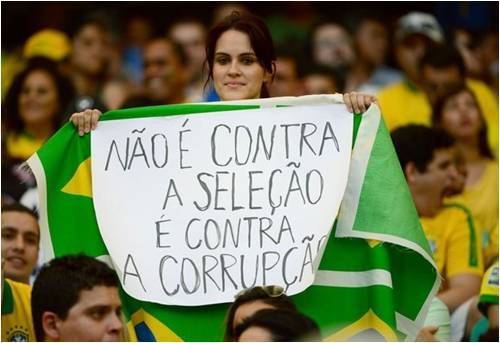While football players are throwing balls in the gates, holding million of peoples' breaths and flags in the air, protests against the World Cup in Brazil are intensifying and holding the Brazilian government's breath on the social and economic future conditions of a population clamoring for more equality and reforms.
Starting from last June 2013 with a 20 centavos bus fare increase in the city of São Paulo, then evolving into a much broader movement by groups and individuals irate over a range of issues including the country's high cost of living, corruption, ineffective public transport, poor education and health care, while billions were being spent on sporting events and the lavish new stadium projects, nearly all the 12 host cities for the 2014 FIFA World Cup have seen protests since the world's soccer tournament kicked off on June of this year. People inside the stadiums are rooting for the Seleção Brasileira, people outside the stadiums are rooting for a better Seleção do Governo.
In response to the uprisings, Amnesty International launched a global campaign, Yellow Card, to address the federal government and the state authorities, along with the municipalities that are hosting the World Cup games, on the human right to freely express their ideas, opinions, and exercising their rights to peaceful assembly, demonstrations and public protests, to which the police have responded with the use of force, and in some cases, "less lethal" weapons such as tear gas and rubber bullets. The excessive use of force by police is not contemplated.
Moreover, on June 5th Atila Roque, executive director of Amnesty International Brazil, stated that "Brazil's deficient policing record, reliance on the military to police demonstrations, lack of training and an atmosphere of impunity creates a dangerous cocktail in which the only losers are peaceful protesters."
According to Art. 19 and Art. 20 of the United Nations Universal Declaration of Human Rights, "Everyone has the right to freedom of opinion and expression, this right includes freedom to hold opinions without interference and to seek, receive and impart information and ideas through any media and regardless of frontiers" (19) and "Everyone has the right to freedom of peaceful assembly and association" (20).
And according to the Brazilian constitution, at Chapter I, Art. V, paragraphs XVI, XVII, XVIII it states that "all persons may hold peaceful meetings, without weapons, in places open to the public, regardless of authorization provided that they do not frustrate another meeting previously called for the same place, subject only to prior notice to the competent authority" (XVI), and "freedom of association for lawful purposes is fully guaranteed and paramilitary association being forbidden" (XVII).
If the population is protesting though, it means that the voice of the government must "translate itself" into real and tangible actions. Dilma Rousseff responded. Yesterday I carefully listened to her speech on the latest development of the world cup protests and demonstrations, on the violence in the streets and the authorities behaviors. Please let me share some of her words with you (here's the video in Portuguese).
Four main remarks caught my attention:
1. Dilma's statement on her obligation to "ouvir a voz das ruas" (listen to the voice of the people in the streets) , a cross-national dialogue with all the society's segments, but above all, with the law and the order, fundamental for democracy;
2. Translation of the people' right to freedom of speech, expression and peaceful assembly, called "impulso desta nova energia política" ( impulse of this new political energy) into productive actions, in a better and faster way, "a lot of things that Brazil has not fully achieved yet due to political and economic limitations";
3. Her commitment to condemning unjustified violence and destruction of public and private property, fire cars, stone at buses and creation of chaos by a "violent and authoritarian minority in the major urban centers" and assuring, on the other hand, a response of non-violent maintaining of the public order by public authorities;
4. Firm acknowledgement on the status of public services, which need to be of higher quality: this includes quality schools, health care quality, better public transport and fair price, more security. This can only take place if the institutions and government make a change.
And in this last point, she lists the next actions the government will discuss: National Urban Mobility Plan, Allocation of 100 percent oil to education, bringing immediately thousands of doctors from overseas to expand the service SUS, along with the profound political reform that could widen popular participation. (Fingers crossed).
So, Presidenta Dilma promised as she was speaking, that she will talk in the coming days with the heads of the other powers to join efforts, inviting the governors and mayors of major cities in the country to a great deal about the improvement of public services.
I would highly suggest Mr. Roque and Ms. Rousseff to discuss about the breeders of violence's profiles, who incite violence and why they do so, to dig and understand the causes of the situation, which is obviously slipping out of hand.
Especially because the Brazilian presidential elections are coming up in October, so for more informed and more-aware citizens, we need transparent information and real results.
To watch some videos of the protests and have a general understanding (wish I could report from there and share my eyes with yours), I suggest these two:
• CNN Thousands of protests in Brazil (May, 2014 just before the games)
• VICE news ( Here there are four parts) Contra a Copa: The Other Side of Brazil's World Cup
Great articles and reports can be also found on The Guardian, New York Times, Reuters, Forbes, The Economist , BBC Brasil, Next city ,Epoca, Al Jazeera, France24
Good also to dig into Twitter hashtags: #Salasocial #worldcup2014 #copa2014 #OcupeEstelita #copacomprada
Follow Gaia on Twitter: @GaiaParadiso

